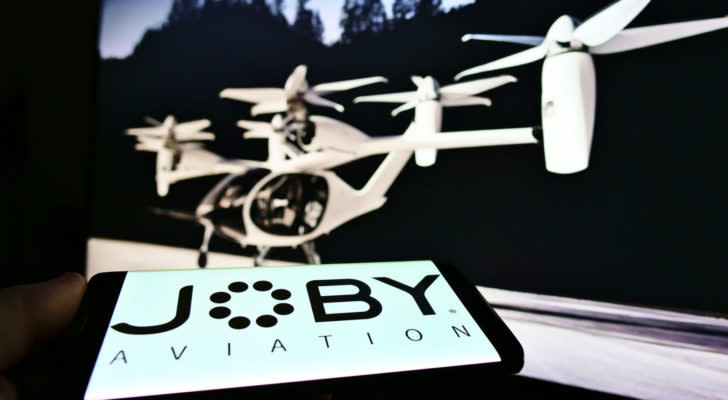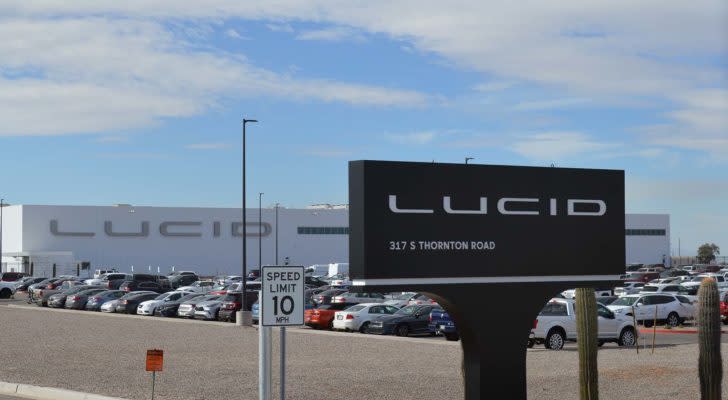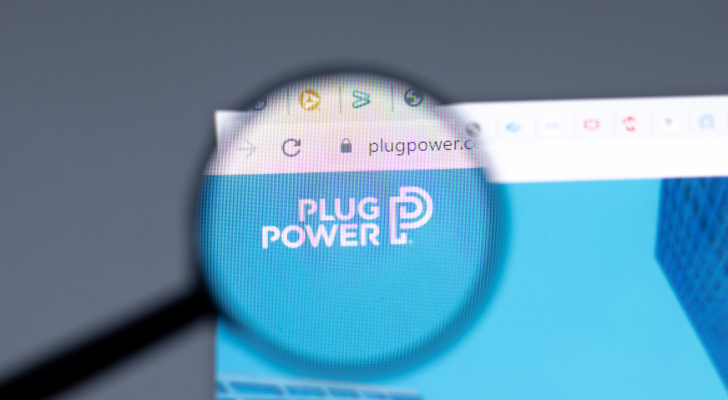Feeling Lucky? 5 ‘Jackpot’ Stocks to Buy for 2024.
This article is an excerpt from the InvestorPlace Digest newsletter. To get news like this delivered straight to your inbox, click here.
As the former editor of InvestorPlace.com’s “Moonshot Investor,” let me say this:
Investing in longshots is hard.
InvestorPlace - Stock Market News, Stock Advice & Trading Tips
For every winning moonshot you pick, many more will go to zero. It’s why startup investors rarely talk about their success rate, and why options traders never mention how their algorithms are doing… even at the Thanksgiving dinner table. No one wants to admit they only have a 15% hit rate.
But when these investors do land on a winner, their gains can offset even the steepest losses. Just one Tesla (NASDAQ:TSLA)… one GameStop (NYSE:GME)… one massive home run… When you’re buying stocks that can rise 100-fold, you mathematically only need one winner to offset 99 others that go to zero. It’s how firms that fund startups — from Softbank to Sequoia Capital — have stayed alive for so long.
So… how do you find 100x stocks like Tesla or GameStop?
Some of these are game changers that bring new technologies to life. Tesla in electric vehicles… OpenAI with large language models… Moderna (NASDAQ:MRNA) with mRNA vaccines… the list will only grow longer with each passing decade.
Other companies are short squeezes — struggling firms with such small market capitalizations that even tiny buying pressures can send prices soaring. Some, like American Airlines Group (NASDAQ:AAL) and Hertz (NASDAQ:HTZ), have even survived their ordeal to become “normal” companies again.
There are also plenty of in-between assets. Cryptocurrencies like Dogecoin (DOGE-USD) are seen as leading-edge technology by some, and a worthless meme asset by others. Squint hard enough, and you might even say the same about CEO Ryan Cohen’s turnaround of GameStop.
But one thing pulls these “jackpot-like” bets together:
They’re early-stage investments that reward those who get in first.
Tesla could have turned ever $10,000 invested into $3.2 million… provided you invested in 2010. And plenty of GameStop investors are still sitting on 1,500% gains because they decided to buy in 2020, before the mad rush began.
This week, our writers at InvestorPlace.com, our free news site, highlight five longshot bets to buy for 2024. Though most of these picks will likely fail, history tells us that you only need to land one moonshot to turn a small portfolio into a fortune…
“Jackpot” Stocks to Buy for 2024: Joby (JOBY)

Source: T. Schneider / Shutterstock.com
I’ll admit to being a skeptic of “flying cars.” Electric vertical takeoff and landing (eVTOL) aircraft are notoriously expensive to produce, and the majority will require a pilot’s license to operate. In other words, flying cars will be a small niche for the very wealthy for the foreseeable future.
The flagship eVTOL from Joby Aviation (NYSE:JOBY) is no different. The S4 2.0 is projected to cost $1.3 million once it reaches production and will require about 500 hours of training to operate. Most of its users will likely hire them as taxis to avoid the hassle of owning and operating these aircraft.
Nevertheless, Joby still has significant potential. And eVTOLs could someday become a mass-market reality as production gains scale. Electric vehicles, after all, went through a similar transformation. Artificial intelligence (AI) could also help eVTOLs become self-flying, reducing the need for trained pilots.
Chris MacDonald makes an even stronger case for Joby in an InvestorPlace.com article this week. In it, he details how the company is speeding past the competition:
“Joby marked a milestone with the first electric air taxi flight in New York City. A partnership with Delta Airlines has brought about the potential for New York City to become an early launch market…
“Additionally, the company’s backlog, driven by orders from the U.S. Department of Defense (DOD), is $131 million. Joby invested $264 million in R&D in the first nine months of 2023, signaling its commitment to growth.
“All of these contribute to optimism that JOBY stock will do great things and will skyrocket more in the future. Here’s why I think it’s entirely possible that 2024 could bring about new highs for this flying car stock.”
Joby Aviation is also the best-capitalized of its competitors, with $1.1 billion of cash available for research and development (R&D) and production scaling. Rival Archer Aviation (NYSE:ACHR) has less than half that figure.
This head start makes Joby the most likely U.S.-based flying car stock to succeed. Though there’s still plenty of risk, Joby is a firm that could turn a small investment into jackpot winnings.
Lucid (LCID)

Source: Around the World Photos / Shutterstock.com
Most of our writers are understandably negative about Lucid Group (NASDAQ:LCID), the company founded by former Tesla chief engineer Peter Rawlinson. Louis Navellier and his staff called the firm “likely to tank post-earnings,” and Dana Blankenhorn rightly notes that Lucid loses $338,000 for every vehicle it produces.
“The cost structure of the Arizona-based company is unsustainable,” Blankenhorn writes. “You don’t want to join them.”
However, News Writer Eddie Pan notes this week at InvestorPlace.com that Lucid’s five top backers added shares during the quarter.
“While it may not seem like it this year, Lucid has a competitive advantage over its rivals due to its support from Saudi Arabia’s Public Investment Fund (PIF) and its affiliate, Ayar Third Investment. Earlier this year, Ayar agreed to purchase shares worth $1.8 billion, bringing its total investment into Lucid to $5.4 billion. PIF and Ayar are majority shareholders of LCID stock with a 60.5% stake.”
The funding will go a long way in helping Lucid rework its pricing model, which has included opening a new factory in Saudi Arabia and revamping its lineup.
That’s because Lucid needs to move down-market to succeed. The EV startup has long struggled to sell high-priced sports cars, since relatively few people can afford the $140,000 price tag of Lucid’s “midrange” offerings. That’s led to unsold inventories, low sales and poor cash flow. In Q3, Lucid sold only 1,457 vehicles.
Funding from these key backers now gives Lucid a second chance. Already, we’re seeing the average price of its 2024 lineup drop into the $80,000-$90,000 range. Though chances of success are still slim, Lucid’s solid financial backing makes it the most likely U.S.-based EV startup to beat Tesla at its own game.
Terran Orbital (LLAP)

Source: Jurik Peter/ShutterStock.com
This week at InvestorPlace.com, Omor Ibne Ehsan picks out Terran Orbital (NYSE:LLAP) as a potential winner of the space race. The satellite solutions company has an enormous backlog, which he believes gives Terran significant upside.
In my view, the biggest bull case for Terran Orbital is its massive $2.6 billion backlog, fueled by a contract from Rivada. The company anticipates converting 80% of this backlog into revenue over the next two years, yet its market valuation sits at just $154 million. Once Terran Orbital begins delivering on its initial orders, I believe the stock could climb substantially higher.
Terran Orbital is also on track to become profitable within two years — a remarkable feat for a company that earned only token revenues as late as 2021. Analysts believe the South Florida-based firm will double revenues every year through 2025.
Of course, there’s plenty of risk with this moonshot bet. The firm’s long-term debt outweighs its $150 million market capitalization, giving management preciously little breathing room. Satellites are also a tough business, as Intelsat’s 2020 bankruptcy showed. Capital costs are high, and competitive advantages are hard to keep.
Still, Terran’s contract with Rivada suggests this is the space-based firm to keep in your back pocket. High barriers to entry cuts both ways; if Terran Orbital can succeed, it will likely dominate its niche for a long while to come.
Plug Power (PLUG)

Source: Postmodern Studio / Shutterstock
Earlier this month, Plug Power (NASDAQ:PLUG) issued a “going concern” warning in its third-quarter earnings. Shares have since lost almost half of their value, compounding a previous 50% loss this year. (The stock is consequently down 75%.)
Faisal Humayun now sees the selloff as overdone. In an update this week, the longtime InvestorPlace.com writer notes that the cash crunch seems temporary.
“I believe that PLUG stock is oversold and a massive short-squeeze rally is in the cards. There are some big investments being initiated to boost the global hydrogen economy… [and] the hydrogen supply challenge is a transitory issue.”
Other analysts have since chimed in that Plug’s “going concern” warning was more of an accounting technicality than a death sentence. The company has plenty of cash it can still raise, given its $1 billion in inventory and large reserve of hydrogen assets and government grants. These assets can be used as collateral if the firm wants to avoid an equity raise.
Plug Power is also riding a wave of interest in clean energy. The company’s hydrogen fuel cell systems are a compelling alternative to lithium-ion batteries, which take longer to charge. The Albany, New York-based firm has also long supplied Walmart (NYSE:WMT) with green hydrogen systems.
I’ll admit to repeatedly being negative about Plug Power’s prospects. I tend to dislike companies with such long odds of success. But Faisal has a point that moonshot bets can become attractive when a selloff gets deep enough.
Soleno Therapeutics (SLNO)

Source: shutterstock.com/Romix Image
Researchers have long found mixed evidence whether investors should buy biotech stocks that just announced positive clinical trial data. Some have found that markets overreact to positive news (leading to future losses), while others have found no such evidence.
This will matter greatly to Soleno Therapeutics (NASDAQ:SLNO), a company that’s seen a 500% surge in share prices since announcing strong clinical trial results for its flagship drug in September. In a Phase 2 study follow-up, DCCR (diazoxide choline) tablets were shown to be potentially effective at combating symptoms of Prader-Willi syndrome, a rare genetic condition .
On the one hand, shares could sink back to Earth as the harsh realities of the Food and Drug Administration (FDA) approval process sets in. Approving drugs can take years, and only a handful of new therapies make it to market each year.
On the other hand, the success of DCCR could turn Soleno into a 10x winner. As Gabriel Osorio-Mazzilli notes for InvestorPlace.com this week, the biotech startup has been busy rearming itself with money and talent.
“DCCR is not only effective, but also a good teammate, as it is generally well tolerated and has no unexpected safety issues. These findings, presented at the Prader-Willi Research Foundation Symposium, are like a victory cheer for both the scientific community and the individuals and families affected by PWS.
“But these are not just victories on the medical front. Soleno, as a company, is making strategic moves on the financial front. Closing a round of funding to the tune of $129 million is like giving a strong dose of energy to their research and development efforts. They have even welcomed new members to their board, such as industry veteran Matthew Pauls, and added Dr. Mike Huang to their clinical development team.”
These are signs of a well-run biotech that’s preparing for a “groundbreaking chapter” in its development. Bringing a drug to market requires a different set of skills from the initial research phase, and Soleno’s pivot tells us they’re able to make the right changes.
Though Soleno’s stock remains risky, the company is making all the right moves to push this novel orphan drug.
Beating the Stock Market “House”
These early-stage jackpot-like bets are a swashbuckling corner of finance where losses are tolerated, and successes can turn small fortunes into massive ones. This is especially true if you’re investing in founders with little prior experience.
Yet, these investments can turn early backers into literal billionaires, as Facebook’s Peter Thiel found. His initial $500,000 investment has turned into more than $1 billion in cash.
That’s why you should pay particular attention to Luke Lango’s latest presentation on early-stage AI moonshots. Luke tells us he’s found a way to “jump the line” and invest in these companies with way lower volatility and a shot at bigger payouts down the line. (Think WAY lower volatility and a shot at bigger payouts in way less time.) Now, Luke Lango is showing YOU how to “jump the line.” Register here for that event.
I hope you all are having a wonderful Thanksgiving holiday. I’ll see you back here next week.
On the date of publication, Tom Yeung did not hold (either directly or indirectly) any positions in the securities mentioned in this article. The opinions expressed in this article are those of the writer, subject to the InvestorPlace.com Publishing Guidelines.
Tom Yeung is a market analyst and portfolio manager of the Omnia Portfolio, the highest-tier subscription at InvestorPlace. He is the former editor of Tom Yeung’s Profit & Protection, a free e-letter about investing to profit in good times and protecting gains during the bad.
More From InvestorPlace
ChatGPT IPO Could Shock the World, Make This Move Before the Announcement
Musk’s “Project Omega” May Be Set to Mint New Millionaires. Here’s How to Get In.
The Rich Use This Income Secret (NOT Dividends) Far More Than Regular Investors
The post Feeling Lucky? 5 ‘Jackpot’ Stocks to Buy for 2024. appeared first on InvestorPlace.
